In this blog, we move away from the Royal Air Force and take a look at the Major Ronald Anthony Markham, one of Meltons best known soldiers who served with the Coldstream Guards. He was killed in France shortly after the outbreak of WW1 and his body was one of the few repatriated back to the UK for burial.
Ronald Anthony was born in on the 15th October 1870 in West Cowes, Isle of Wight, Hampshire and baptised on the 24th November 1870 in St. Mary’s Church, Melton Mowbray, Leicestershire. Born and officially registered at birth with the Christian name of Ronald, at his baptism he was given the second Christian name of Anthony, and latterly he was also referred to as Roderick Anthony Markham.
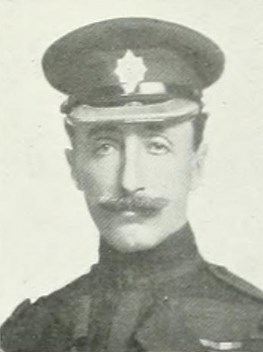
He was the son of Colonel William Thomas Markham who had served in the Crimean War in the Rifle Brigade and Coldstream Guards and his wife Anne Emily Sophia Grant (also known as Daisy Grant or Mrs Colonel William Thomas Markham). Anne’s father was the famous Scottish painter Sir Francis Grant. Her portrait, painted by her father, hangs in the National Gallery of Scotland, and has been noted for its depiction of Victorian womanhood. Another of his famous paintings, The Melton Hunt, which he completed in 1839 was purchased by the Duke of Wellington.
His siblings were, Mabel Wilhelmine Frances, born 5th April 1858, William Hope, born 13th December 1859 , Cecile Mary Isabella, born 6th February 1861, twins Claron Henry and Cyril Faulke, born 21st July 1866 , Hermione Violet Cyril, born 9th September 1867 and Rupert Evelyn, born 13th December 1868, Ethel Winifred Victoria, born 21st November 1871, Nigel Ivan, born 10th November 1872, Averil Constance Antoinette Janetta, born 1873, Gwendoline Beatrice Sanchia May, born 1876, and Sibyl Annesley Giana, born 1877
In April 1881, Ronald was a school boarder, and was residing at Palmer Flatt Boarding School, Aysgarth, Yorkshire and latterly he was educated at Charterhouse (Daviesites 1884-1887).
He initially joined the 3rd Battalion Prince of Wales’s Volunteers, South Lancashire Regiment and according to the Army and Navy Gazette published 20th April 1889 he was promoted to 2nd Lieutenant on April 13th.
He joined the Coldstream Guards from the Militia in December 1890, becoming a Lieutenant in August 1896, and Captain in December 1899.
He served with the first advance against the Khalifa in the Nile Expedition of 1899, for which he received the Egyptian Medal and Clasp. An important and largely unsung figure in the early exploration of the Bahr-el-Ghazal region, he is a rare and officially confirmed officer recipient of the Bahr-el-Ghazal clasp.
From August 1899, to August 1903, he was employed with the Egyptian Army, serving as the Aide De Camp to the Sirdar Sir Reginald Wingate from April 1900 to December 1902, for which he received the Insignia of the 4th Class of the Imperial Order of the Medjidieh.
He travelled up the White Nile from Khartoum on 3 July 1901 with Pasha Von Slatin in the gunboat ‘Sheikh’ to deliver important communications from the Sirdar to local commandants in the region, and to seek news from the Austin-Bright Survey Expedition in July 1901. In the course of this journey he travelled inland, meeting and negotiating with local Sheikhs and tribal leaders.
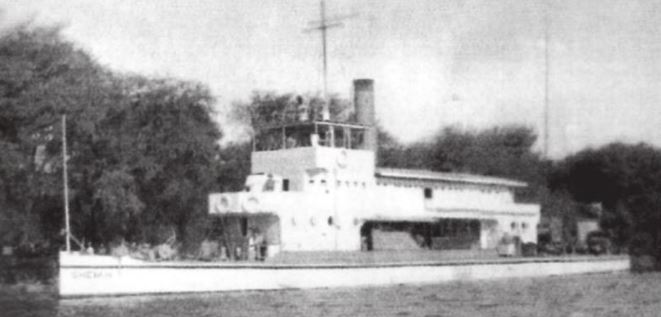
After the murder of Bimbashi Scott Barbour on 10 January 1902 and the subsequent punitive expedition, there was much tension and potential danger in the region. A few months later, Bimbashi Markham was sent on an expedition up the White Nile from Khartoum (with Pasha Von Slatin) in the gunboat ‘Sheikh’ with several private communications from the Sirdar to the local commandants. Leaving on 3 July 1902, his expedition took several weeks.
A binbashi, alternatively bimbashi, (from Turkish: Binbaşı, “chief of a thousand”, “chiliarch”) is a Major in the Turkish army, of which term originated in the Ottoman army. The title was also used for a Major in the Khedivial Egyptian army as Bimbashi (1805–1953).
As recorded in The Sudan Intelligence Report No.84 (1st to 31st July 1901): ‘Bimbashi Markham left Khartoum on the 3rd instant in the gunboat “Sheikh” for Sobat, Baro, and Pibor rivers to endeavour to open up communication with the Austin-Bright Survey Expedition, about which no news is as yet forthcoming. He carried letters from the Sirdar to the commandants of the Abyssinian posts at Gore and in the neighbourhood of Lake Rudolf, as well as one for Major Austin himself.
Markham was also with Miralai Sparkes Bey, Commandant of the Bahr-El-Ghazal Expedition, when they arrived at Khartoum from Wau on 28 September 1901. Markham had joined him from Meshra er Rek, as mentioned in Sudan Intelligence Report No.86 (1st to 30th September 1901).
On April 19th 1901, the London Gazette published the following notice “Whitehall, April 18, 1901, THE King has been pleased to give and grant unto each ot the undermentioned Officers His Majesty’s Royal licence and authority that he may accept and wear the Insignia of the Imperial Ottoman Order appearing against his name, the Decorations in question having been conferred by His Highness the Khedive of Egypt, authorised by His Imperial Majesty the Sultan of Turkey, in recognition of the services of these Officers while employed in His Highness’s Army. Medjidieh, Fourth Class, Captain Ronald Anthony Markham, Coldstream Guards.”
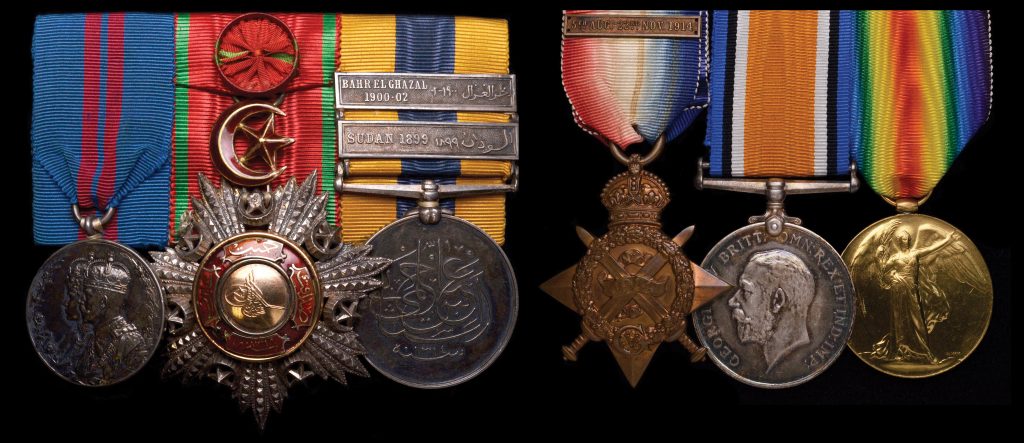
His medals were sold by the Auctioneers Bonhams in November 2014 for £360 incl premium.
He was promoted to Major in 1907 and was serving with the 2nd Battalion Coldstream Guards. At the time of the 1911 Census, Tony was stationed at Malplaquet Barracks, Marlborough Lines, Aldershot, Hampshire.
In August 1914, the 2nd Battalion were based at Windsor. Eight days after the declaration of war, on August 12th 1914, Major Markham and the 2nd Battalion Coldstream Guards entrained at Windsor on two trains at 3:10am and 5:15am bound for Southampton. On arrival at Southampton, the right half of the Battalion embarked on SS Olympia and the left half on SS Novia and sailed for Le Havre at 8pm and 7pm respectively.
The Battalion arrived at le Havre around noon on the 13th and disembarkation was completed by 2:30pm after which they marched in hot weather to rest camp, arriving at 4:30pm.
The 2nd Bn was with the BEF during the historic retreat from Mons.
On the 21st the Battalion was ordered to advance at 8.00am and to gain the Zonnebeke – Langemarck road, from which point it was to conform with converging attacks by the Irish Guards and the 3rd Battalion Coldstream Guards, on the right and left flanks respectively.
The Battalion entrenched a strong position which they held throughout the 22nd and 23rd, under an exceedingly heavy fire (principally high explosive) from the enemy’s artillery. Considerable opposition was found and the whole of the battalion was absorbed into he firing line, but by 3pm, the line of the road had been gained.
The Battalion was ordered to fall back during the night to conform with the line held by the remainder of the Brigade. This operation as successfully carried out under the cover of darkness and the Battalion entrenched a strong position which they held throughout he 22nd and 23rd under exceedingly heavy fire, principally high explosive from the enemy’s artillery.
Tony was Mentioned in Dispatches twice by Field Marshal Sir John French, 1st Earl of Ypres who commanded the British Army on the Western Front.
The casualties of the 2nd Battalion from the 1st Battle of Ypres were Major Markham (killed), 2nd Lieutenant R. L. C. Bewicke – Copley (wounded), 15 Other Ranks killed, 34 wounded, and 4 missing.
Major R. A. Markham (Second in Command) who fell mortally wounded and whose loss was much regretted; was struck by a spent bullet and died without recovering consciousness two days later in hospital at Boulogne.
On Friday October 30th 1914 The Melton Mowbray Times & Vale of Belvoir Gazette published the following article under the heading. “MELTON’S ROLL OF HONOUR” – SIX LOCAL OFFICERS KILLED – MAJOR MARKHAM TO BE BURIED IN SYSONBY. A deep gloom has been cast over Melton Mowbray by the fact that four of its prominent foxhunting citizens, and other officers from Eaton and Kirby Bellars, have lost their lives whilst serving their country. A week ago we recorded with great pleasure and pride that Major R. A. Markham, of the 2nd Battalion Coldstream Guards, had been mentioned in Field Marshall Sir John French’s latest despatches for special gallantry in the field. It is now our painful duty to announce that he was fatally wounded at the beginning of the week.
On Monday evening a cable was received from Lady Sarah Wilson stating that he had died in her hospital at Boulogne without regaining consciousness, having been shot in the head.
Corporal Handley, who served in Major Markham’s Battalion of the Coldstream Guards up to the time he was wounded on the 15th September, speaks in the most glowing terms of many excellent qualities which the deceased possessed both as a soldier and a gentleman. To quote his words, “He was a gentleman to the officers and the rank and file. He was a soldier who was wonderfully liked by every man in the battalion, and the 2nd Coldstream Guards will mourn his loss for many years to come. Several times when we were without food he ran down the lines giving us a cheery word, and said he had tried his best to get some for us, but was sorry he had failed. He always did the best he possibly could for us, and never omitted to look after our comforts. In my opinion there was no better officer in the British Army, both for the way he looked after his men, and as a soldier.
Major Markham was our senior Major, and would have been Colonel after the war had he lived through it. He never knew what it was to be afraid, and whenever the Coldstream’s were called upon to do any desperate fighting he was always in the thick of it. When he got into the firing line he would take his place in the trench, borrow the rifle from the man who happened to be next to him, and do his share just the same as an ordinary Private. He has performed numerous personal acts of gallantry. On one occasion he was instrumental in saving the No.2 Company from total destruction. We were posted on the summit of a hill, with instructions to hold the position at all costs. Soon we came under an exceptionally heavy artillery fire which in a very short time would have wiped us all out. Major Markham suddenly dashed up to us in the face of the fiercest fighting, and led us back to a place of safety. We all retired in good order, and have only Major Markham to thank that any of us escaped alive. It was Major Markham who brought to the notice of the General a gallant deed performed by Corpl. Brown and Pte. Dobson who have been recommended for the V.C. He asked for volunteers to fetch in a wounded soldier, and these two went out in the face of a heavy fire.
Major Ronald Anthony ‘Tony’ Markham was wounded in action on 23rd October 1914 and died 2 days later on the 25th. An early casualty of the Great War, during which the repatriation of the bodies of officers and soldiers was still possible, his body was repatriated back to the UK.
On Thursday 5th November 1914, the Melton Mowbray Mercury and Oakham and Uppingham news reported the following:
MELTON OFFICER’S FUNERAL. MAJOR MARKHAM INTERRED AT SYSONBY. The esteem and respect enjoyed by the late Major R. A. Markham and Coldstream Guards, who died earlier in the week at a hospital in Boulogne from the effects of wounds in the head sustained whilst fighting for his country’s honour, was demonstrated by the large number of persons who attended the funeral at Melton Mowbray on Saturday afternoon , the body having arrived just previously.
It was in a polished oak coffin, with brass furniture, covered with the Union Jack, and was conveyed straight to the Parish Church. The chief mourners were Mr. Archibald Smith (brother-in-law), Mr. Guy Markham, Mr. Frederick Markham, Mr. Richard Pearson, Mr. Davidson, Corporal Handley, and Coldstream Guards (who has returned home from hospital after being wounded in France), and Mr. H. Wood.
Those present included many of the deceased officer’s hunting comrades, amongst those noticed in the church being the Countess of Kesteven, the Countess of March, Sir G. S. Hanson, Captain Sir P. T .Fowke, Colonel Bouverie, Lieutenant-Colonel R. B. Muir, Mr. A. V. Pryor, Mr. and Mrs. R. E. Strawbridge, the Hon. Gerald Walsh, Captain and Mrs. F. Forester, Mr. C. J. Phillips, Colonel C. E. Fate, M.P.. Mr. F. B. Mildmay, M.P., Mrs. Cecil Chaplin, Miss Chaplin, Miss C. T Muir, the Misses Brocklehurst, Mr. Bernard Wilson, Mr. J. Montagu, Mr. Hare, Major T. B. Atkinson, Mrs. R. Blakeney, Captain H. Allfrey, Captain H. T. Barclay. Captain R. B. Sheriffe, Lieutenant Stewart Muir, Lieutenant Reynolds, the Rev. F. W. Knox (representing the Duke of Rutland), the Rev. R. C. Dashwood, the Rev. P. F. Gorst, Mr. E W. J. Oakley, J.P., Dr. H. C. Roberta, Dr. M. Dixon. Dr. Furness, Mr. G. W. Brewitt, MT. J. Gill, J.P., Mr. E sleeves. Mr A. H. Marsh, Mr. S. Fletcher, Dr. G. T. Wiliam, Mr. S. H. Garner, Mr. J. Atteriburrow, Mr. W. F. Hill, CC., Mr. F. Wright, Mr. G. Dickinson, and many others.
The whole of the men who have enlisted in the Reserve A Squadron of the Leicestershire Regiment were present under Major Wardsworth Ritchie, 116 were also the Reserve C Company 5th Battalion Leicestershire Regiment under Corporal Harker. and a detachment of non-commissioned officers and men from the Melton Army Remount Depot. under Captain Saunders, formed a guard of honour in the churchyard.
The Rev. Caron Blakeney read the service, the Rev. Canon Markham taking the lesson. Suitable voluntaries were played on the organ by Mr. M. Sargent, Mus. Bac and the choir rendered the hymns, “My God, my Father, while I stray” and “Peace, perfect peace.” At the conclusion of the service the mournful procession wended its way to the hamlet church Cemetery at Sysonby, where the interment took place, the Rev. Canon Blakeney officiating at the graveside.’ A very large number of handsome wreaths were sent.
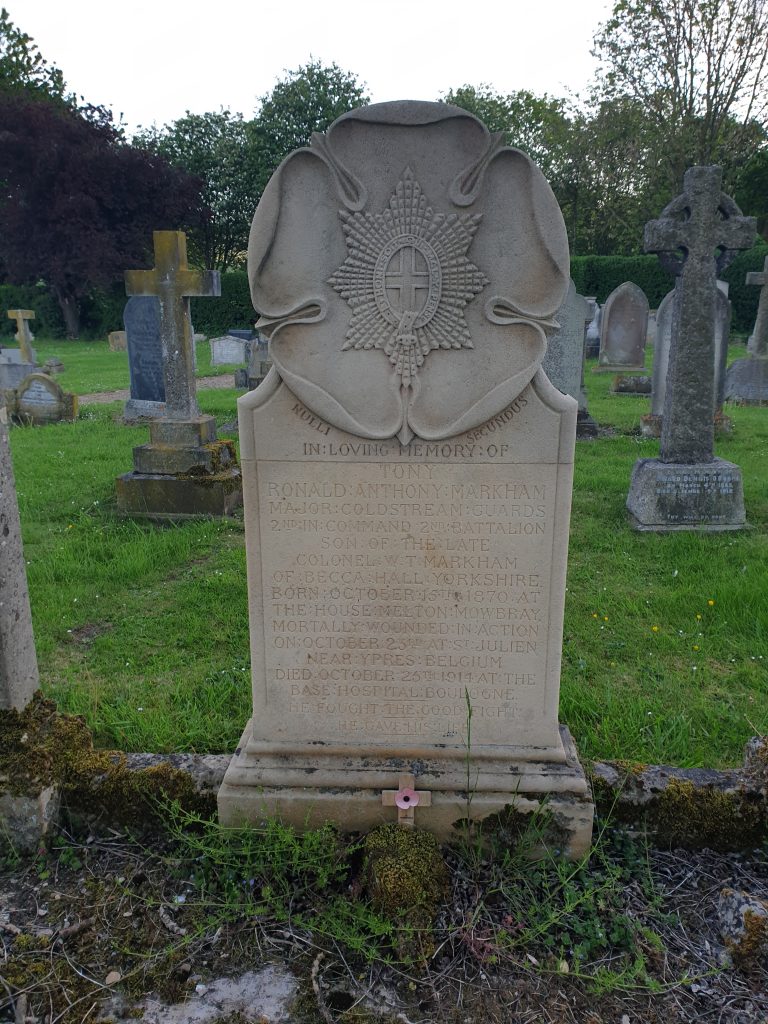
He was a member of the Guards’ Nulli Secundus, and the Turf Clubs; also of the M.C.C. and I Zingari. He was fond of cricket and shooting, and was a very keen and hard rider to hounds. He grew up in Melton Mowbray, from which place he had hunted all his life, and is buried in Sysonby Churchyard.
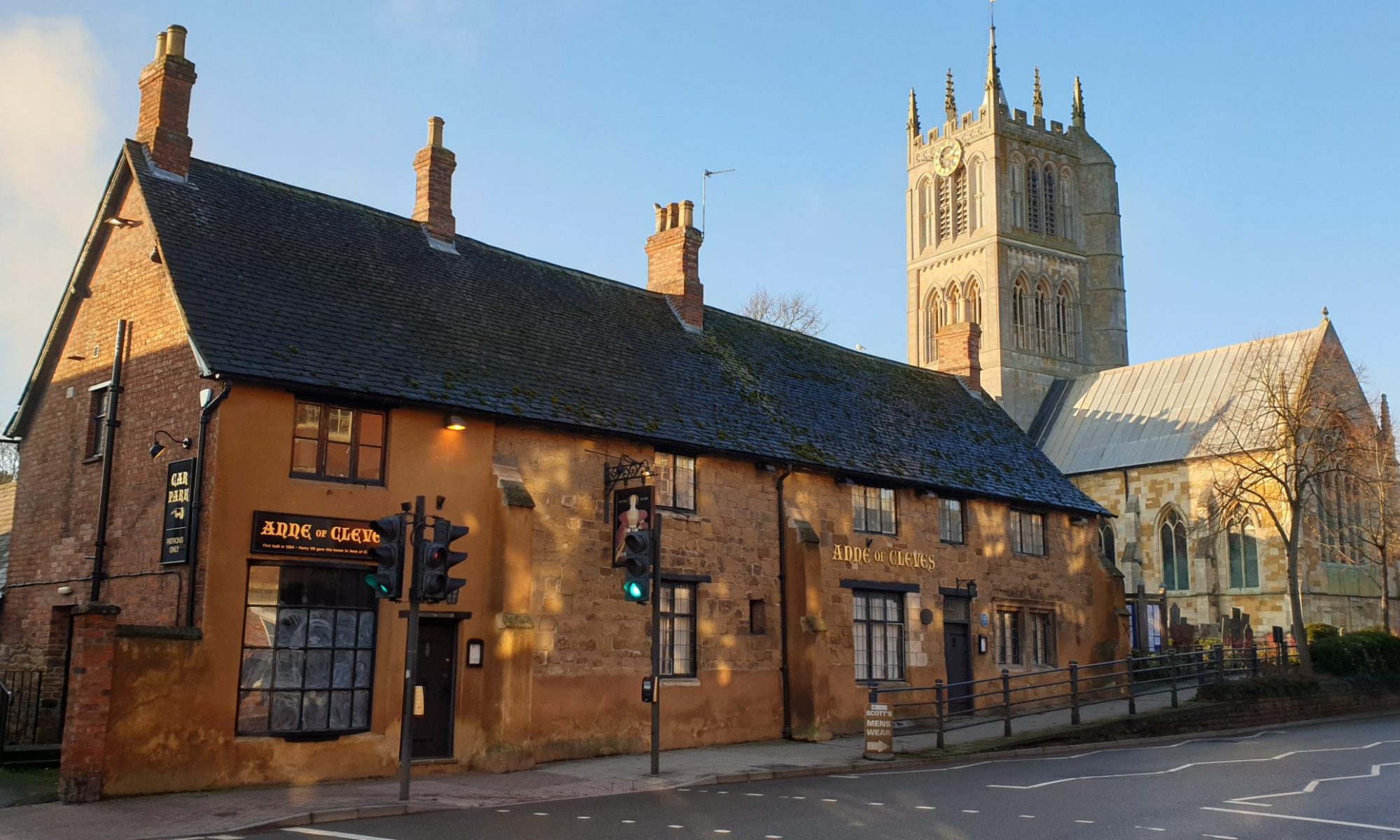
One Reply to “06 – Major Ronald Anthony Markham”
Comments are closed.